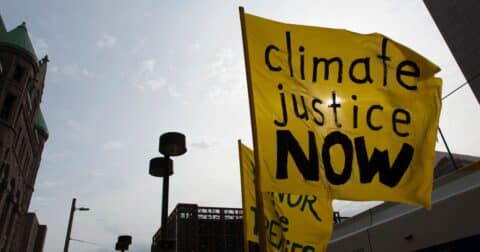Feature
Dairy and Meat Industries Push for Access to H-2A Farmworkers While the Trump Administration Slashes Their Pay
Policy•13 min read
Solutions
Cities and climate activists seek accountability for meat and dairy in the court system.


Words by Gabriella Sotelo
Over a three-decade span, 71 percent of industrial greenhouse gas emissions — that is, emissions from factories and manufacturing — were fueled by just 100 fossil fuel producers. Researchers documented the pollution from these so-called “Carbon Majors,” companies including Chevron, BP and Shell, in a database that came to inspire two dozen lawsuits. Now, climate activists are applying those same tactics to hold the meat and dairy industries accountable under the law. A new study by Yale Law School researchers traces this new trend, and finds that when lawmakers fail to hold corporations accountable, lawsuits can become a tool to create change.
Research shows meat and dairy are responsible for anywhere from 11 to 20 percent of global greenhouse gas emissions, yet lawmakers are failing to pass meaningful policies to curb emissions from what’s on our plate. These include methane, from cattle burps and manure waste from dairy and pork farms primarily, as well as the massive amounts of land required to feed animals, both pasture and for feed crops.
In the U.S. for instance, the Inflation Reduction Act passed in 2022 has a goal to reduce greenhouse gas emissions by 40 percent by the year 2030, but its “climate-smart agriculture” funding has mostly gone to fund no-till and cover crops on industrial farms — farming practices that evidence suggests are not effective for curbing emissions. And just as with fossil fuel pollution, when policymakers fail to pass policies to curb emissions, climate advocates turn to the courts.
To date, just two lawsuits are attempting to hold the animal agriculture industry accountable for climate emissions, the authors of the study caution, but these two do suggest an increase in momentum for holding meat and dairy companies accountable. These early lawsuits point to a growing trend — people are seeking to hold all extractive industries accountable, both fossil fuels and livestock companies.
In the past several decades, litigation has become an increasingly successful strategy for climate action. One study found that out of 2,341 climate decisions, half resulted in some favorable impact for climate action. In one 2020 case for instance, Bushfire Survivors for Climate Action sued Australia’s Environment Protection Authority to do more to regulate greenhouse gas emissions in light of a particularly severe series of bushfires the year before, fires arguably made more intense by climate change. The court ordered the EPA to put in place environmental policies, guidelines and objectives for environmental protection from climate change.
The city of Honolulu has been allowed to proceed in its case against fossil fuel distributor Sunoco for misleading the public about the dangers of climate change, a tort case primarily based on allegations that the company failed to disclose information to the public and engaged in deceptive marketing tactics. The case first for climate nuisance claims, and continues the success that litigation has on the “Carbon Majors.”
“Climate litigation is really expanding around the world,” Daina Bray, a lecturer at Yale Law School’s Law, Ethics and Animals Program and a co-author of the report, tells Sentient. That expansion is reflected in a couple of ways, Bray says, “the creativity of theories” and the jurisdictions where these suits are being filed.
One of these creative theories is holding more industries accountable, including the meat and dairy producers adding to the planet’s methane emissions, which inspired Bray, and her colleague Thomas Poston, to dub them as the “Methane Majors.”
In the case of Smith v Fonterra, Michael Smith, a Maori tribe leader in New Zealand filed claims against seven polluters, including the mega-dairy conglomerate, Fonterra. In the lawsuit, Smith alleges that the seven companies are not only responsible for one-third of New Zealand’s greenhouse gas emissions, but the company’s part in contributing to sea level rise, and damage to the land where Smith, some Maori and other New Zealanders live.
Originally the claim was struck down by New Zealand’s Court of Appeals, but the country’s Supreme Court reversed this decision and is now allowing all of Smith’s claims to proceed. The court found that Smith has the right to sue these companies for the harm caused by their emissions, including Fonterra.
In the U.S., New York State’s Attorney General brought suit against meat supplier JBS for misleading the public over their environmental claims.
The Yale researchers also see promise in the JBS case, as it illustrates different legal avenues for climate justice. Though both cases are pending, the efforts are encouraging, says Thomas Poston, co-author of the study and J.D candidate at Yale Law School.
“It’s reassuring that our courts here in the United States remain open to this kind of litigation,” Poston tells Sentient. “Even if a given case does not reach the result that climate advocates might hope for, the fact that there are still venues for questions of justice and accountability to be raised, and potentially mitigated is a good thing.”
Litigation has the potential to shape public discourse, the authors say.
“From farms to slaughterhouse workers to environmental justice communities, water use, the harm to the animals themselves,” Bray says, “any and all creative tools to find accountability and to shine a light on these harms are a reason for optimism.”